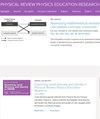物理学入门课程中学生问题解决方案的AI评分:可行性研究
IF 2.6
2区 教育学
Q1 EDUCATION & EDUCATIONAL RESEARCH
Physical Review Physics Education Research
Pub Date : 2023-11-29
DOI:10.1103/physrevphyseducres.19.020163
引用次数: 3
摘要
解题是学习物理的关键,不仅最终解很重要,推导也很重要。对这些衍生品进行分级是劳动密集型的,因为它通常涉及对手写作品的人工评估。人工智能工具并不是一个替代方案,因为即使是简短的答案,它们也需要针对每个问题或一组问题进行专门的培训。广泛预训练的人工智能系统提供了一种潜在的通用评分解决方案,而无需这种特定的训练。本可行性研究探讨了使用MathPix和GPT-4对手写物理衍生进行分级的人工智能辅助工作流程。我们能够成功地扫描手写的解决方案路径,与人工评分者在合成数据集上相比,我们的r平方达到了0.84。所建议的工作流程似乎很有希望用于形成性反馈,但对于最终评估,它最好用于帮助人类评分。本文章由计算机程序翻译,如有差异,请以英文原文为准。

Toward AI grading of student problem solutions in introductory physics: A feasibility study
Solving problems is crucial for learning physics, and not only final solutions but also their derivations are important. Grading these derivations is labor intensive, as it generally involves human evaluation of handwritten work. AI tools have not been an alternative, since even for short answers, they needed specific training for each problem or set of problems. Extensively pretrained AI systems offer a potentially universal grading solution without this specific training. This feasibility study explores an AI-assisted workflow to grade handwritten physics derivations using MathPix and GPT-4. We were able to successfully scan handwritten solution paths and achieved an R-squared of 0.84 compared to human graders on a synthetic dataset. The proposed workflow appears promising for formative feedback, but for final evaluations, it would best be used to assist human graders.
求助全文
通过发布文献求助,成功后即可免费获取论文全文。
去求助
来源期刊

Physical Review Physics Education Research
Social Sciences-Education
CiteScore
5.70
自引率
41.90%
发文量
84
审稿时长
32 weeks
期刊介绍:
PRPER covers all educational levels, from elementary through graduate education. All topics in experimental and theoretical physics education research are accepted, including, but not limited to:
Educational policy
Instructional strategies, and materials development
Research methodology
Epistemology, attitudes, and beliefs
Learning environment
Scientific reasoning and problem solving
Diversity and inclusion
Learning theory
Student participation
Faculty and teacher professional development
 求助内容:
求助内容: 应助结果提醒方式:
应助结果提醒方式:


